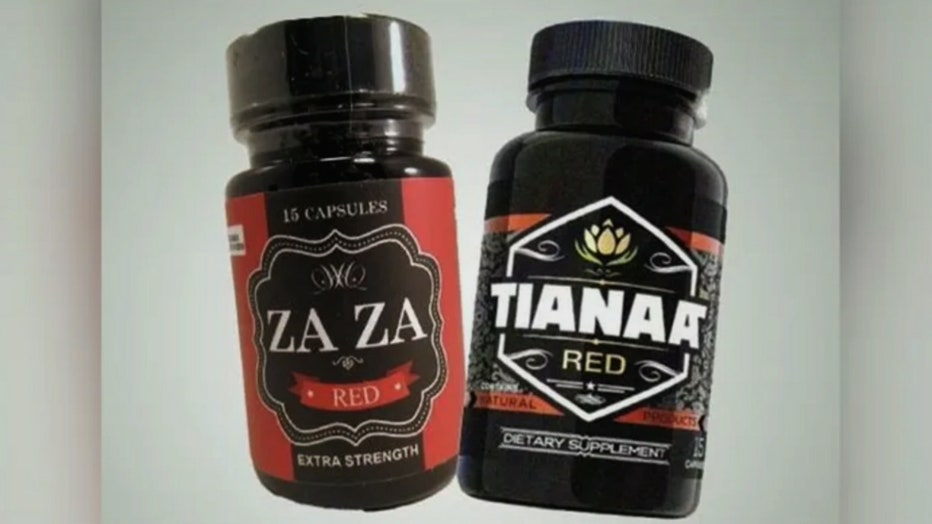Neptune's Fix, tianeptine product, recalled over life-threatening overdose risks

Neptunes Fix recalled products (FDA)
A line of over-the-counter products containing tianeptine has been recalled over life-threatening health risks.
Neptune’s Fix Elixir, Neptune’s Fix Extra Strength Elixir and Neptune’s Fix Tablets have been voluntarily recalled because they contain tianeptine, a tricyclic antidepressant used in some parts of Europe, Asia and South America but not approved by the U.S. Food and Drug Administration. All Neptune's Fix products are being recalled.
The FDA says people who consume Neptune’s Fix tianeptine products are at risk of "life-threatening events" including suicidal ideation or behavior in children, teens and young adults under 25. The agency says people can also unintentionally overdose and experience confusion, seizures, drowsiness, dry mouth and shortness of breath. Those symptoms can be exacerbated by alcohol, the FDA says.
RELATED: What is tianeptine? Lawmakers sound the alarm on 'gas station heroin'
There’s also an increased risk of adverse and potentially lethal effects when tianeptine is mixed with some antidepressants known as monoamine oxidase inhibitors (MAOls).
Neptune's Fix Elixir and Extra Strength Elixir are used as a supplement and are packaged in amber glass bottles with a "shrink sleeve" label that covers the entire cap/bottle and is perforated at the cap to facilitate opening.
Neptune's Fix tablets are packaged in 20-count blister packs held in small boxes or four-count foil packets. The product can be identified by the name Neptune's Fix and its logo which is an illustration of the Roman God Neptune with a green beard and a trident. The products were distributed nationwide to wholesale and retail customers.
Anyone who has the products should stop using them immediately and return them to the place of purchase. You can report adverse effects from using tianeptine products here.
What is tianeptine?

Tianeptine is marketed under names like Zaza and Tianaa (Dekalb County Sheriff's Office handout)
Tianeptine is an antidepressant developed in France in the 1960s that’s marketed under the brand names Coaxil or Stablon in Europe, Asia and South America. It’s approved in more than 60 countries, according to Healthline, but the U.S. is not one of them. It's often referred to as "gas station heroin."
RELATED: Jelly Roll gives powerful speech to Congress: 'Fentanyl transcends partisanship and ideology'
People with an opioid use disorder may be more likely to use tianeptine, the New Jersey Poison Center explains, "as it is inaccurately marketed as a safer alternative to opioids and can have opioid-like effects," the New Jersey Poison Center explains in a bulletin on its website.
Officials say companies that sell tianeptine in the U.S. make unproven claims that it can improve brain function, treat anxiety, depression, pain, opioid use disorder and other ailments.

'Jelly Roll' testifies at Senate fentanyl hearing
In statements during a congressional hearing on fentanyl, singer-songwriter 'Jelly Roll' said "fentanyl is going to make the Sackler family look like saints," referring to the family who founded Purdue Pharma, the maker of OxyContin.
"People develop a tolerance very quickly, and so they rapidly start advancing the dosing," Dawn Sollee, a clinical toxicologist and director of the Poison Control Center in Jacksonville, Fla., told The New York Times. "They will set alarms to wake themselves every two hours to take tianeptine pills so they do not go into withdrawal. And then they have to keep taking more and more just to stay functional."
The FDA says even more serious side effects can occur when people mix tianeptine with other drugs, like antidepressants and anti-anxiety meds.
RELATED: More states legalize fentanyl test strips to fight rising opioid deaths
"These effects included agitation, drowsiness, confusion, sweating, rapid heartbeat, high blood pressure, nausea, vomiting, slowed or stopped breathing, coma, and death," the FDA warns.
Nine states (Alabama, Michigan, Mississippi, Tennessee, Georgia, Indiana, Ohio, Florida, and Kentucky) have already taken action to ban or severely restrict tianeptine, but poison cases are still on the rise.
According to The Times, only four cases of tianeptine exposure were reported nationwide in 2013. Ten years later, in 2023, 391 cases were reported.

